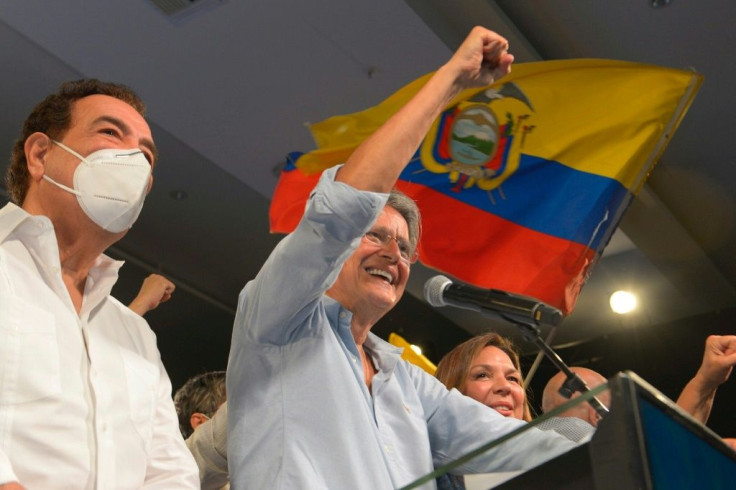President-elect Lasso Pledges 'True Change' To Ecuador
President-elect Guillermo Lasso on Monday announced a "true change" in crisis-wracked Ecuador after bringing to an end an era of left-wing election victories.
The 65-year-old former banker beat socialist economist Andres Arauz in Sunday's poll with official results after 97 percent of the votes were counted showing Lasso leading by 52.5 percent to 47.4.
"Ecuador is beginning a new stage in which we can all live better. Democracy, freedom and Ecuadoran families won," Lasso wrote on Twitter.
Despite coronavirus restrictions, supporters took to the streets of the capital Quito and the largest city, Guayaquil, to celebrate by honking car horns and waving Ecuador flags.
Arauz, 36, who is best known as the political protege of former president Rafael Correa, conceded late on Sunday.
Right-winger Lasso will inherit a pandemic-battered and debt-laden economy and a political system riven by gridlock when he takes over from the unpopular Lenin Moreno next month.
"We'll start working together immediately for true change," said Lasso on Twitter.
"Today we woke up in peace and with the certainty that better days are ahead for everybody."
He faces a tough job during his four-year term with Arauz's leftist Union of Hope coalition the largest party in parliament, while the Packakutik indigenous movement is the second biggest.
"Expecting to transform Ecuador in four years is not possible," Esteban Nichols, a political scientist at Simon Bolivar University, told AFP.
Lasso must also juggle the need to boost an economy that shrunk by 7.8 percent in 2020, while managing the pandemic that has overwhelmed hospitals with more than 340,000 coronavirus infections and over 17,000 deaths.
He faces overall debt of almost $64 billion -- 63 percent of GDP -- of which $45 billion is external debt.
Nichols said Lasso needs to concentrate on "a good vaccination plan" and "stabilizing the economy" to succeed.
Lasso has vowed to immunize nine million Ecuadorans in his first 100 days in office while promoting free markets to boost employment.
So far just 183,000 people have been vaccinated.
It was a case of third time lucky for Lasso, of the Creating Opportunities movement, after his defeats to Correa in 2013 and Moreno in 2017.
It also marked an impressive comeback after finishing 13 percentage points adrift of Arauz in February's first round of voting.

He only scraped into the run-off by less than half a percentage point ahead of indigenous candidate Yaku Perez, who contested the result and claimed to have been the victim of fraud.
Many experts billed the election as a battle of "Correism versus anti-Correism" in a country bitterly divided along political lines.
Correa, who was president for a decade and whose influence on Ecuadoran politics remains strong, would have been Arauz's running mate but for an eight-year corruption sentence.
He moved to Belgium when he left office and remains there avoiding his prison term.
He wished the new government success and asked it to end "the lawfare" he believes was responsible for his conviction.
Pablo Romero, an analyst at Salesiana University, told AFP this was a "profound defeat" for Correa but by no means "the end of Correism."
However, "it won't have the same strength from now on. Correa will remain relegated and we will have to see who within Correism will be able to sustain this."
Speaking in his home city of Guayaquil -- Ecuador's economic motor -- Lasso vowed to install a government of change "without leaving anyone behind."
"I don't arrive with a list of who I want to persecute or see in jail," he said, in what seemed a thinly veiled barb at Arauz.
Prior to the election, Arauz had suggested he wanted to see Moreno charged with neglect over Ecuador's pandemic management.
"I want to see all Ecuadorans free, without fear of the government ... expressing their opinions freely," said Lasso.
He also pledged to regularize the immigration status of some 350,000 Venezuelans living in Peru after fleeing economic collapse under socialist President Nicolas Maduro.
Congratulations poured in from Chile, Colombia, Brazil, Spain, the White House and the IMF, which has lent Ecuador $6.5 billion.
"The electoral process was peaceful and saw a high turnout reflecting the strong commitment of Ecuadorian people to democracy," said the European Union in a statement.
The Organization of American States, Uruguay and the Dominican Republic likewise congratulated Lasso.
But former Bolivian president Evo Morales mourned the defeat of the left in Ecuador, while congratulating Peru's leftist candidate Pedro Castillo on his success in the first round of voting there.
Voting was obligatory for oil-rich Ecuador's 13.1 million registered voters.
© Copyright AFP {{Year}}. All rights reserved.





















